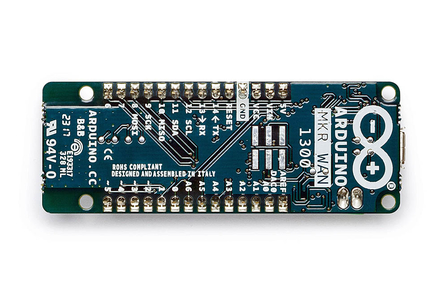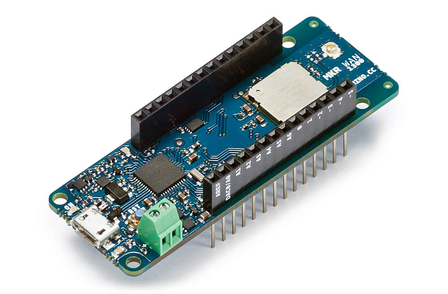In the ever-expanding and demanding IoT universe, Arduino unveils two more boards. The MKR WAN 1300 (LoRa) and the MKR GSM 1400 boards are designed to offer a cost-effective solution for developers, makers, and enterprises by enabling them to quickly add connectivity to and ease the development of battery-powered IoT edge applications.
The MKR WAN 1300 delivers LoRa low-power WAN connectivity, and the Arduino MKR GSM 1400 adds global 2G/3G communications capability. Both boards measure 67.64 mm x 25 mm.

Offering 32-bit computational power similar to the Arduino MKR Zero board, the MKR WAN 1300 is based around the Murata LoRa low-power connectivity module and the Atmel SAM D21 microcontroller, which integrates the low-power, 32-bit ARM Cortex-M0+ processor, 256 kB of flash memory, and 32 kB of SRAM. The board’s design includes the ability to be powered via either two 1.5V AA or AAA batteries or an external 5V input via the USB interface, with automatic switching between the two power sources.
As well as low-power LoRa IoT communications capability, the MKR WAN 1300 offers a typical set of I/O interfaces and the Arduino IDE software environment for code development and programming. Other features include an operating voltage of 3.3V, eight digital I/Os, 12 PWM outputs, and UART, SPI and I2C interfaces.
The Arduino MKR GSM 1400 is also based on the ARM Cortex-M0+ based SAM D21, and adds the u-blox module to deliver global 3G communications ability. The board also features automatic power switching. It uses either a 3.7V lithium polymer (LiPo) battery or an external Vin power source delivering 5V to 12V. While the USB port can also be used to supply 5V to the board, the MKR GSM 1400 is able to run with or without the battery connected.

The MKR GSM 1400 also offers a rich set of I/O interfaces including eight digital I/Os, 12 PWM outputs, UART, SPI and I2C interfaces, analog I/O including seven inputs and one output, and eight external interrupt pins. For more details, contact Arduino.